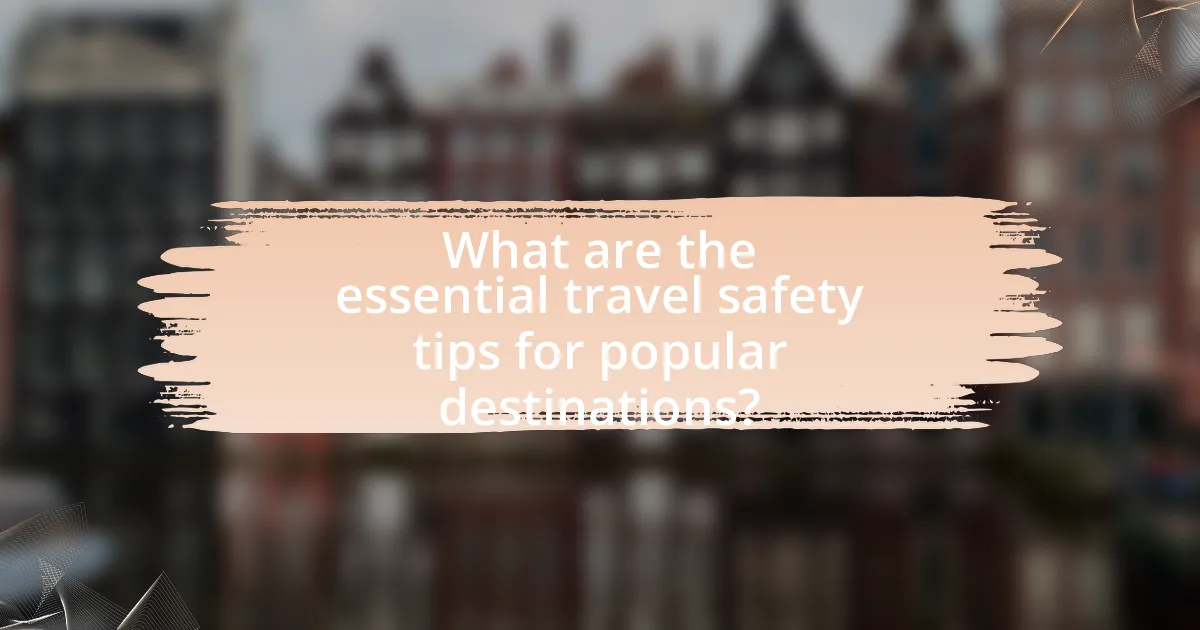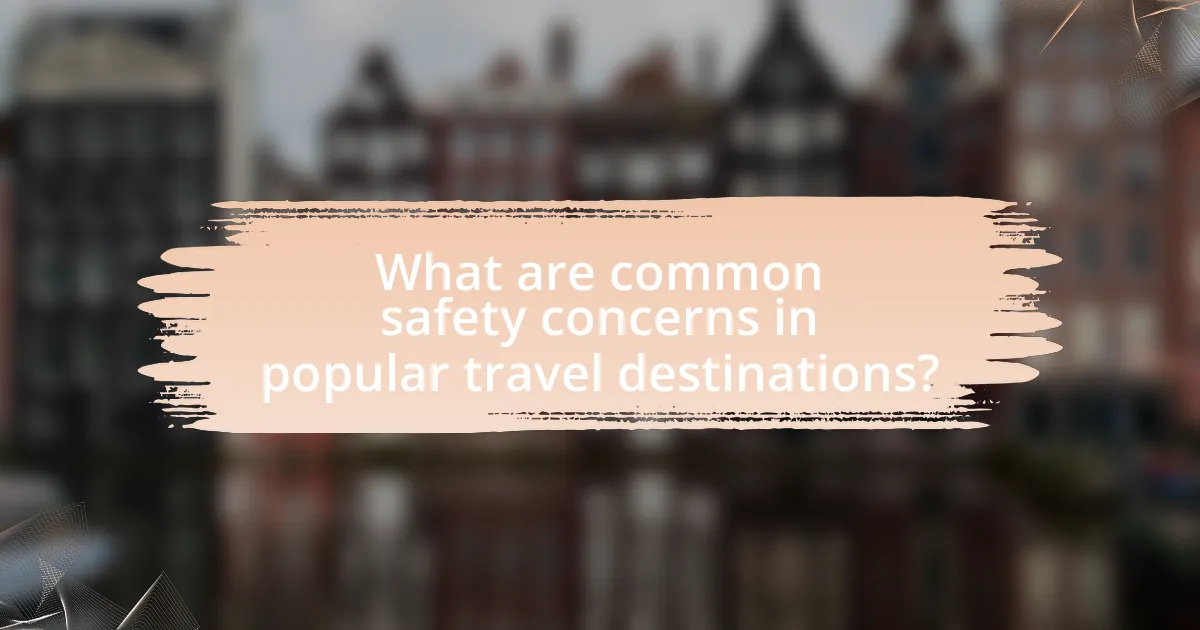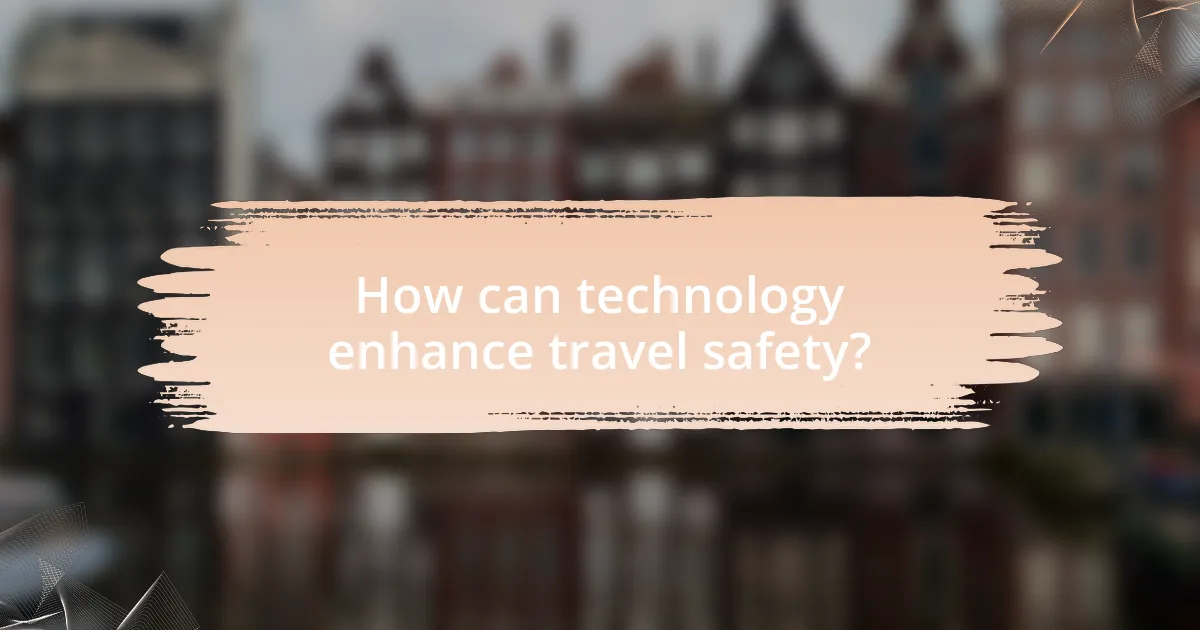The article focuses on essential travel safety tips for individuals exploring popular destinations. It emphasizes the importance of being aware of surroundings, securing belongings, and understanding local laws and customs to mitigate risks such as theft and scams. Key topics include preparation for potential safety risks, securing important documents, and utilizing technology for enhanced safety. Additionally, the article outlines common safety concerns, health precautions, and practical tips to ensure a secure travel experience, ultimately guiding travelers in making informed decisions while navigating unfamiliar environments.

What are the essential travel safety tips for popular destinations?
Essential travel safety tips for popular destinations include staying aware of your surroundings, securing your belongings, and researching local laws and customs. Travelers should remain vigilant in crowded areas to avoid pickpocketing, which is common in tourist hotspots. Keeping valuables in a secure location, such as a hotel safe, reduces the risk of theft. Additionally, understanding local laws can prevent unintentional offenses; for example, certain countries have strict regulations regarding photography in public spaces. Following these guidelines enhances personal safety and ensures a more enjoyable travel experience.
How can travelers prepare for potential safety risks?
Travelers can prepare for potential safety risks by conducting thorough research on their destination, including understanding local laws, customs, and prevalent safety concerns. This preparation allows travelers to identify areas that may pose risks, such as high-crime neighborhoods or regions prone to natural disasters. For instance, the U.S. Department of State provides travel advisories that outline safety conditions in various countries, helping travelers make informed decisions. Additionally, travelers should register with their embassy or consulate, which can provide assistance in emergencies. By taking these proactive steps, travelers can significantly reduce their vulnerability to safety risks while exploring new destinations.
What documents should travelers keep secure while exploring?
Travelers should keep their passport, identification cards, travel insurance documents, and any necessary visas secure while exploring. These documents are essential for identification, legal entry into countries, and access to medical services if needed. For instance, a passport is required for international travel, while travel insurance documents provide proof of coverage in case of emergencies. Keeping these documents secure helps prevent identity theft and ensures that travelers can navigate any legal or medical situations that may arise during their journey.
How can travelers research the safety of their destination?
Travelers can research the safety of their destination by consulting government travel advisories, local news sources, and travel forums. Government travel advisories, such as those from the U.S. State Department or the UK Foreign Office, provide updated information on safety conditions, crime rates, and health risks in various countries. Local news sources can offer insights into current events and safety issues specific to the area. Additionally, travel forums like TripAdvisor or Lonely Planet allow travelers to read firsthand accounts and experiences from other visitors, which can highlight potential safety concerns.
What precautions should travelers take while on the move?
Travelers should remain vigilant and aware of their surroundings while on the move. This includes keeping personal belongings secure, avoiding displaying valuables, and staying in well-lit, populated areas. According to the U.S. Department of State, being aware of local customs and potential scams can significantly reduce risks. Additionally, using reputable transportation services and having emergency contacts readily available enhances safety during travel.
How can travelers stay aware of their surroundings?
Travelers can stay aware of their surroundings by actively observing their environment and minimizing distractions. This includes keeping electronic devices stowed away while walking, maintaining situational awareness by scanning the area for unusual behavior, and being mindful of local customs and potential hazards. Studies show that individuals who engage in active observation are less likely to become victims of crime, as they can identify and react to threats more effectively.
What should travelers do if they feel unsafe in a location?
Travelers should seek immediate safety by moving to a secure location, such as a crowded area or a well-lit public space. If feeling unsafe, they should contact local authorities or emergency services for assistance. According to the U.S. Department of State, being aware of surroundings and having a plan can significantly enhance personal safety while traveling.

What are common safety concerns in popular travel destinations?
Common safety concerns in popular travel destinations include theft, scams, health risks, and natural disasters. Theft is prevalent in crowded areas, with pickpocketing being a significant issue in cities like Barcelona and Paris, where tourists are often targeted. Scams, such as overcharging or fake services, frequently occur in tourist hotspots, particularly in places like Rome and Bangkok. Health risks, including foodborne illnesses and inadequate medical facilities, can arise in destinations with varying hygiene standards, such as parts of Southeast Asia and Africa. Additionally, natural disasters, including hurricanes and earthquakes, pose risks in regions like the Caribbean and Japan, necessitating awareness and preparedness among travelers.
How do theft and scams affect travelers?
Theft and scams significantly impact travelers by causing financial loss and emotional distress. Travelers often face pickpocketing, credit card fraud, and deceptive schemes that exploit their unfamiliarity with local customs. According to a report by the U.S. State Department, over 20% of American travelers reported experiencing theft or scams while abroad, highlighting the prevalence of these issues. Such incidents not only result in immediate monetary loss but can also lead to increased anxiety and a diminished travel experience, as victims may feel unsafe and vulnerable in their surroundings.
What are the most common types of scams targeting tourists?
The most common types of scams targeting tourists include pickpocketing, fake tour guides, and overcharging for services. Pickpocketing occurs frequently in crowded areas, where thieves exploit distractions to steal valuables. Fake tour guides often approach tourists with offers of guided tours at inflated prices, misleading them about their credentials. Overcharging for services, such as taxis or meals, is prevalent in tourist hotspots, where prices are not clearly displayed, leading to unexpected charges. According to a report by the United Nations Office on Drugs and Crime, these scams significantly impact tourists, causing financial loss and distress.
How can travelers protect themselves from pickpockets?
Travelers can protect themselves from pickpockets by using anti-theft bags, keeping valuables in front pockets, and remaining vigilant in crowded areas. Anti-theft bags often feature locking zippers and cut-resistant straps, making it more difficult for thieves to access belongings. Keeping valuables in front pockets reduces the risk of theft, as these areas are less accessible to pickpockets. Additionally, maintaining awareness of surroundings, especially in crowded places like markets or public transport, can help travelers identify suspicious behavior and avoid potential theft.
What health and safety issues should travelers be aware of?
Travelers should be aware of health and safety issues such as infectious diseases, food and water safety, and personal security risks. Infectious diseases like malaria, dengue fever, and COVID-19 can pose significant threats in certain regions, necessitating vaccinations or preventive medications. Food and water safety is crucial, as consuming contaminated food or water can lead to illnesses like gastroenteritis; travelers should opt for bottled water and well-cooked meals. Additionally, personal security risks, including theft and scams, are prevalent in many tourist areas, making it essential for travelers to remain vigilant and secure their belongings.
How can travelers avoid food and waterborne illnesses?
Travelers can avoid food and waterborne illnesses by consuming only bottled or boiled water and eating well-cooked foods. Drinking untreated water can expose travelers to pathogens, while consuming raw or undercooked foods increases the risk of infections. According to the World Health Organization, approximately 2 billion people are affected by foodborne illnesses annually, highlighting the importance of safe food and water practices. Additionally, travelers should avoid street food and ensure that food is prepared in hygienic conditions to further reduce their risk of illness.
What vaccinations or health precautions are recommended for specific destinations?
Vaccinations and health precautions vary by destination and are essential for safe travel. For example, travelers to sub-Saharan Africa are often advised to receive vaccinations for yellow fever, hepatitis A, and typhoid, as these diseases are prevalent in the region. In Southeast Asia, vaccinations for hepatitis A, hepatitis B, and Japanese encephalitis are recommended due to the risk of these infections. Additionally, travelers should consider malaria prophylaxis when visiting areas where malaria is endemic, such as parts of Africa and South Asia. The Centers for Disease Control and Prevention (CDC) provides specific vaccination recommendations based on travel destinations, ensuring that travelers are informed about necessary health precautions.

How can technology enhance travel safety?
Technology enhances travel safety by providing real-time information and communication tools that help travelers make informed decisions. For instance, mobile applications like Google Maps and Waze offer live traffic updates and route suggestions, which can help avoid dangerous areas. Additionally, safety apps such as bSafe and Life360 allow users to share their location with trusted contacts and send emergency alerts, increasing personal security. According to a study by the International Air Transport Association, 70% of travelers feel safer using technology for navigation and emergency assistance, demonstrating its effectiveness in enhancing safety during travel.
What apps can help travelers stay safe while exploring?
Travelers can enhance their safety while exploring by using apps such as Life360, which provides location sharing and alerts for family and friends, and bSafe, which offers features like emergency SOS alerts and location tracking. Additionally, the Smart Traveler app by the U.S. Department of State provides real-time safety updates and travel advisories for various destinations. These apps are designed to keep travelers informed and connected, significantly reducing risks associated with exploring unfamiliar areas.
How can location-sharing apps improve safety for travelers?
Location-sharing apps can improve safety for travelers by enabling real-time tracking and communication with trusted contacts. These apps allow users to share their location with family or friends, ensuring that someone is aware of their whereabouts, which can be crucial in emergencies. For instance, a study by the National Institute of Justice found that individuals who share their location with others are less likely to become victims of crime, as the presence of a safety network acts as a deterrent. Additionally, location-sharing features can help travelers navigate unfamiliar areas more safely by providing alerts about potential hazards or unsafe zones, further enhancing their overall security while exploring new destinations.
What role do emergency contact apps play in travel safety?
Emergency contact apps enhance travel safety by providing immediate access to critical information and contacts in case of emergencies. These applications allow travelers to store emergency contacts, medical information, and location data, ensuring that help can be reached quickly. For instance, a study by the International Air Transport Association found that 70% of travelers feel more secure knowing they can quickly contact emergency services or family members through such apps. This accessibility can significantly reduce response times in crises, thereby improving overall safety while traveling.
What are the best practices for using technology securely while traveling?
To use technology securely while traveling, individuals should implement several best practices. First, travelers must ensure their devices are updated with the latest security patches and software updates, as outdated systems are more vulnerable to cyber threats. According to a report by the Cybersecurity & Infrastructure Security Agency, 85% of successful cyberattacks exploit known vulnerabilities that could be mitigated by timely updates.
Second, utilizing a virtual private network (VPN) is crucial when connecting to public Wi-Fi networks, as it encrypts internet traffic and protects sensitive information from potential eavesdroppers. Research from the Pew Research Center indicates that 54% of Americans have experienced a data breach, highlighting the importance of secure connections.
Third, travelers should avoid accessing sensitive accounts, such as banking or email, on public networks. The Federal Trade Commission warns that public Wi-Fi can be a hotspot for hackers, making it risky to enter personal information.
Lastly, enabling two-factor authentication (2FA) on accounts adds an extra layer of security, making unauthorized access more difficult. A study by Google found that 2FA can block 100% of automated bots and 96% of targeted attacks.
By following these practices, travelers can significantly enhance their technology security while exploring new destinations.
How can travelers protect their personal information online?
Travelers can protect their personal information online by using strong, unique passwords for each account and enabling two-factor authentication. Strong passwords reduce the risk of unauthorized access, while two-factor authentication adds an extra layer of security by requiring a second form of verification. According to a 2021 report by the Cybersecurity & Infrastructure Security Agency, using unique passwords can prevent up to 80% of hacking-related breaches. Additionally, travelers should avoid using public Wi-Fi for sensitive transactions, as unsecured networks can expose personal data to cybercriminals. Using a virtual private network (VPN) can encrypt internet traffic, further safeguarding personal information.
What steps should travelers take to secure their devices?
Travelers should take several steps to secure their devices, including using strong passwords, enabling two-factor authentication, and keeping software updated. Strong passwords protect against unauthorized access, while two-factor authentication adds an extra layer of security by requiring a second form of verification. Keeping software updated ensures that devices have the latest security patches, reducing vulnerabilities. According to a 2021 report by Cybersecurity & Infrastructure Security Agency, 85% of successful cyberattacks exploit known vulnerabilities, highlighting the importance of regular updates. Additionally, travelers should avoid using public Wi-Fi for sensitive transactions and consider using a virtual private network (VPN) to encrypt their internet connection, further safeguarding their data.
What practical tips can ensure a safe travel experience?
To ensure a safe travel experience, travelers should prioritize thorough research on their destination, including understanding local laws, customs, and potential safety risks. This preparation allows travelers to navigate unfamiliar environments more confidently and avoid dangerous situations. For instance, according to the U.S. Department of State, travelers are advised to review travel advisories and register with the Smart Traveler Enrollment Program (STEP) to receive important updates and assistance while abroad. Additionally, maintaining awareness of surroundings and avoiding risky areas, especially at night, significantly reduces the likelihood of encountering safety issues.